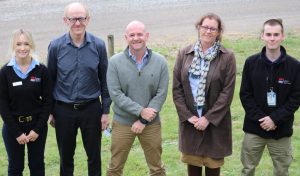
A beefed up biosecurity presence in the Greater Sydney region is set to keep farmers in business, maintain export markets and provide greater protection for the broader NSW community.
It’s all thanks to a new $1.13 million partnership between Local Land Services and the NSW Department of Primary Industries.
Minister for Primary Industries Niall Blair visited the Elizabeth Macarthur Agricultural Institute (EMAI) in Camden yesterday to announce the new biosecurity funding for the Greater Sydney region.
He said this was “a big win for the farming community and our community as a whole’’.
The minister said the funding partnership would see more on-ground resources dedicated to addressing biosecurity threats around Sydney.
“This funding will see a new full time District Vet and a dedicated Plant Biosecurity Officer service the region,’’ he said.
“A further two full time field officers have also been funded through Greater Sydney Local Land Services,” Mr Blair said.
[social_quote duplicate=”no” align=”default”]“Biosecurity protects our economy, environment and community from the impacts of pests, diseases, weeds and contaminants.”[/social_quote]
The Greater Sydney region is one of the State’s key food bowls, producing $1.5 billion in food and agricultural products every year.
Biosecurity protections are particularly important for landholders in the Greater Sydney region given their close proximity to our major ports of entry, and the high density of domestic animals and plant nurseries where new pests and diseases can easily spread.
“Our successful response to the recent incursion of Red Imported Fire Ants is one example that clearly highlights the need for surveillance, early detection, traceability and a fast, cohesive response from NSW Government agencies,” Mr Blair said.
The new agreement is a key part of the $250,000, three year, Greater Sydney Peri Urban Biosecurity Program, which focuses on strengthening collaboration within the region and improving the capacity to respond to, manage and control biosecurity threats.
